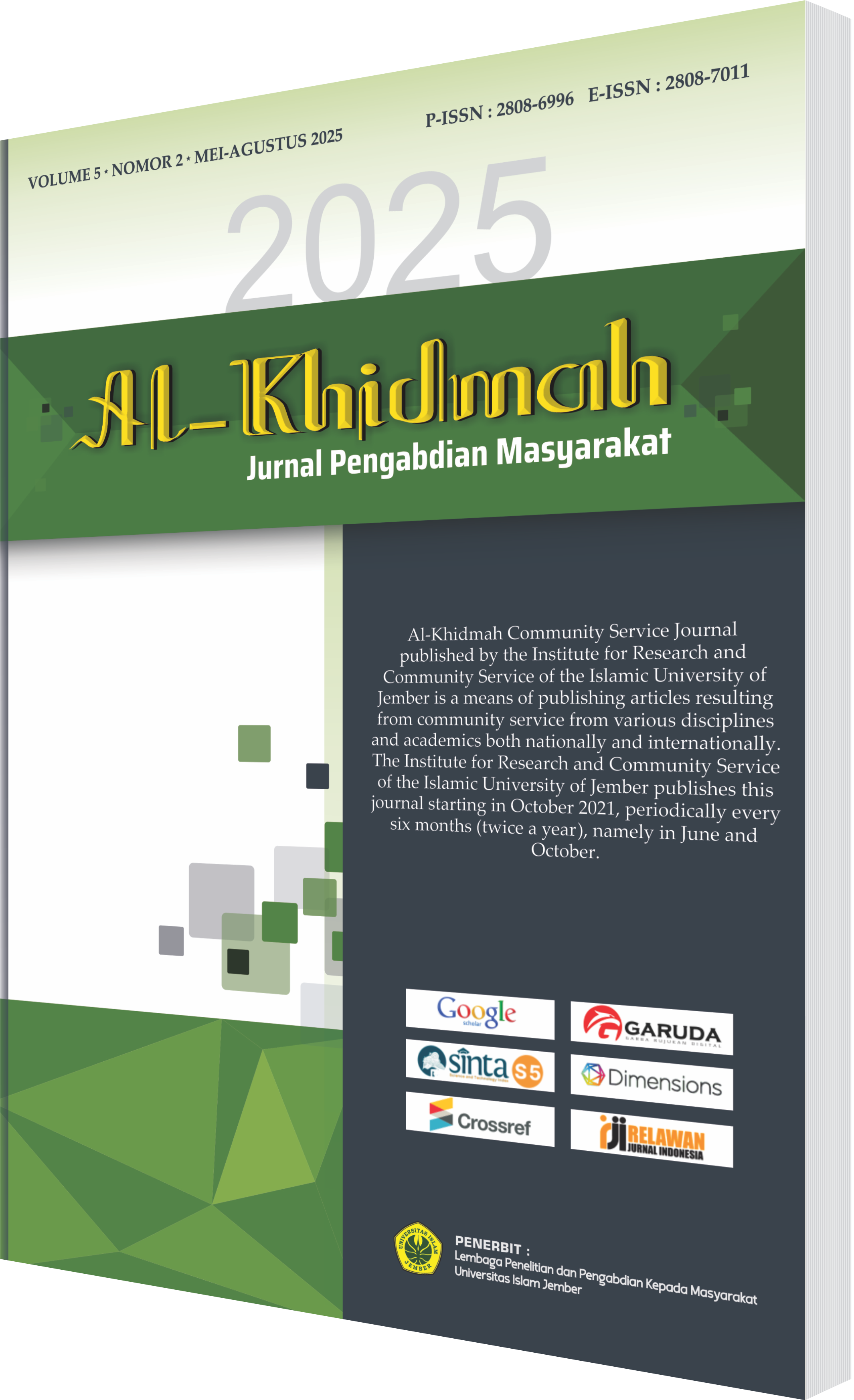Peningkatan Kompetensi Guru melalui Coaching for Teaching di Al Baitul Amien
DOI:
https://doi.org/10.56013/jak.v5i2.4243Keywords:
teacher training; coaching for teaching; professional development; reflective learning; pedagogical competenceAbstract
Coaching for Teaching is a strategic approach to teacher professional development, emphasizing reflective practice, empathy, and student empowerment. This community engagement initiative aimed to enhance teachers’ understanding, motivation, and skills in applying coaching principles to classroom instruction. The program was conducted at SMP Al Baitul Amien over 8 hours and involved 30 teacher participants. The training used lectures, simulations, and case studies. Evaluation was carried out using a Likert-scale questionnaire and open-ended questions. The results showed significant improvements in understanding of coaching principles (from 2.4 to 4.3), motivation to apply coaching (from 2.9 to 4.5), and coaching skills (from 2.2 to 4.0). Qualitative responses revealed that teachers gained deeper awareness of meaningful classroom relationships. The training proved effective as a teacher development model and is recommended for replication and further development through school-based learning communities.
Downloads
References
Arnold, W. W. (2017). Service And The Millennial Business Student: The Motivating Influence Of An E-Book Class Project. American Journal of Business Education. https://doi.org/10.19030/AJBE.V10I2.9915
Darling-Hammond, L., Hyler, M. E., & Gardner, M. (2017). Effective teacher professional development. Learning Policy Institute. https://learningpolicyinstitute.org/product/effective-teacher-professional-development-report
González, L. M. O. (2023). Coaching – A New Trend in the Field of Teacher Education. https://doi.org/10.18690/um.pef.1.2023.8
Grant J. AU3 - Cavanagh, M. J. AU4 - Parker, H. M., A. M. A.-P. (2021). The State of Play in Coaching Today: A Comprehensive Review. Coaching: An International Journal of Theory, Research and Practice, 14(1), 1–23. https://doi.org/10.1080/17521882.2021.1876373
Grant, A. M., Passmore, J., Cavanagh, M. J., & Parker, H. M. (2021). The State of Play in Coaching Today: A Comprehensive Review. Coaching: An International Journal of Theory, Research and Practice, 14(1), 1–23. https://doi.org/10.1080/17521882.2021.1876373
Kebudayaan, K. P. dan. (2023). Laporan Nasional Kinerja Guru Indonesia. Puslitjakdikbud.
Kolb, D. A. (2015). Experiential Learning: Experience as the Source of Learning and Development (2nd ed.). Pearson Education.
Leithwood D., K. A.-J. (2020). Transformational school leadership for large-scale reform: Effects on students, teachers, and their classroom practices. School Effectiveness and School Improvement, 31(2), 224–244. https://doi.org/10.1080/09243453.2020.1714503
McGarr F., O. A.-G. (2022). Coaching as a pedagogical tool: A systematic review of the literature. Teaching and Teacher Education, 108. https://doi.org/10.1016/j.tate.2021.103522
McGarr, O., & Gallanaugh, F. (2022). Coaching as a pedagogical tool: A systematic review of the literature. Teaching and Teacher Education, 108, 103522. https://doi.org/10.1016/j.tate.2021.103522
Rosato, J. L., Diaz, L., Ray, M., Twarek, B., & Yanek, D. (2022). Coaching to Improve CS Teaching and Learning. In Proceedings of the 53rd ACM Technical Symposium on Computer Science Education V. 2. https://doi.org/10.1145/3478432.3499191
Saclarides, E. S. (2023). Coaches and teachers co-teaching: exploring the challenges and support of co-teaching as a coaching activity. International Journal of Mentoring and Coaching in Education. https://doi.org/10.1108/ijmce-11-2022-0100
Tolkacheva, E. A., & Ivanov, S. G. (2022). Teaching Materials in the Implementation of the Technology «Learning Through Teaching». Развитие Образования. https://doi.org/10.31483/r-104328
Downloads
Published
How to Cite
Issue
Section
License
Copyright (c) 2025 Miftahul Hakim

This work is licensed under a Creative Commons Attribution-ShareAlike 4.0 International License.





